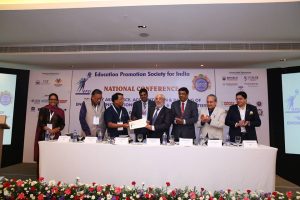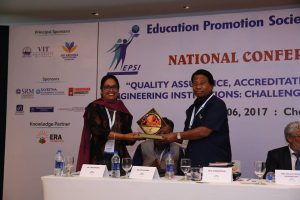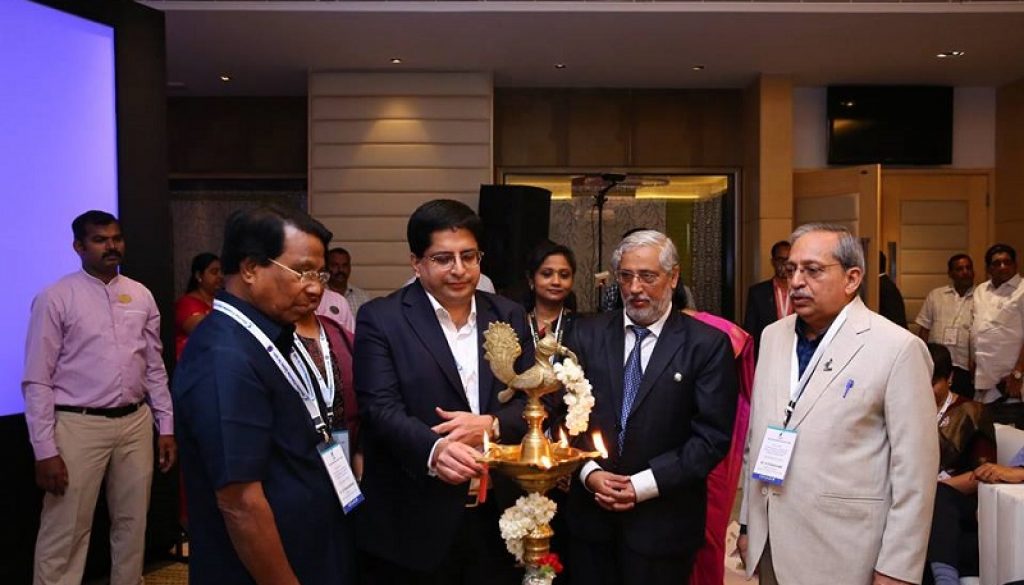Making Engineering education cutting-edge and globally competitive
Leading educationists deliberated upon the challenges and opportunities in the context of ‘Quality Assurance, Accreditation & Ranking of Engineering Institutions’ in India at the National Conference of EPSI on October 6 in Chennai.
 The conference was presided over by Prof. Anil Dattatraya Sahasrabudhe, Chairman, AICTE; Mr. Manish Kumar, MD & CEO, NSDC; Dr. G. Viswanathan, President, EPSI; Dr. H Chaturvedi, Alternate President, EPSI; Dr. M R Jayaram, Sr. VP, EPSI; and Dr. Prashant Bhalla, Treasurer, EPSI.
The conference was presided over by Prof. Anil Dattatraya Sahasrabudhe, Chairman, AICTE; Mr. Manish Kumar, MD & CEO, NSDC; Dr. G. Viswanathan, President, EPSI; Dr. H Chaturvedi, Alternate President, EPSI; Dr. M R Jayaram, Sr. VP, EPSI; and Dr. Prashant Bhalla, Treasurer, EPSI.
While setting the context for the conference; Dr. Prashant Bhalla, President, Manav Rachna Educational Institutions and Treasurer, EPSI said: “Engineering graduates have a strategic and long-term impact on productivity growth in industry and service sectors. However, with automation and other emerging technologies replacing most process-based jobs, employability of engineering graduates has become more challenging. Higher Education, in general and engineering education in particular, requires a total transformation in order to meet the needs of employers and challenges faced by professional communities. An all-integrated, concerted effort is needed to address this challenge and ensure that engineering institutes are able to deliver on the targets set for them”.
In his presidential address, Dr. G Viswanathan suggested that the Government should give autonomy to private institutions to enable an increase in the GER of the country. While requesting regulators to act as facilitators, he urged for the abolishment of the affiliation system.
 Dr. H Chaturvedi addressed about the august audience on the theme of the conference and shared the challenges faced by engineering institutions, the latest trends & technologies and the available job opportunities.
Dr. H Chaturvedi addressed about the august audience on the theme of the conference and shared the challenges faced by engineering institutions, the latest trends & technologies and the available job opportunities.
Prof. Sahasrabudhe stressed on the need for making engineering education viable, cutting-edge and globally competitive. He added that this is possible, only through a greater collaboration between the Government and Private Institutions. While encouraging institutions to introspect, he suggested that Quality Assurance is not singularly dependent on accreditation from governing bodies but should be self-practiced. Inclusivity as a unique parameter for rankings was suggested. He also chaired a session on “Creating Start-up Eco system in Engineering College by setting up Incubation centres”, wherein he informed about the role of AICTE and the adapted mechanism.
Mr. Manish Kumar discussed the transforming ‘skill landscape’ of the country. He shared the collaborative efforts of NSDC and Manav Rachna Educational Institutions in skilling the youth and invited other institutions to partner with NSDC in a similar manner. He also talked about the huge potential for the establishment of a ‘Skills University’ and invited more public-private partnerships to carry forward the skill agenda.
In a plenary session on “New Accreditation Norms of NBA & NIRF Ranking”, Dr. Anil K Nassa, Member Secretary, National Board of Accreditation shared that NIRF has modified its system as per the suggestions received from various institutions and the various modalities being followed.
400+ delegates including leading Government functionaries, Vice Chancellors, Academicians and Entrepreneurs attended the day-long conference.



